Jimmy Mac Interview – Lorde’s Player
What’s it like backing one of the biggest artists in the world and witnessing her meteoric rise to the top? Andy Jones gets the inside story from Jimmy Mac who plays keyboards and percussion for the Billboard Number One artist and Grammy Award winner Lorde… Surely one of the songs of last year was Lorde’s […]

What’s it like backing one of the biggest artists in the world and witnessing her meteoric rise to the top? Andy Jones gets the inside story from Jimmy Mac who plays keyboards and percussion for the Billboard Number One artist and Grammy Award winner Lorde…
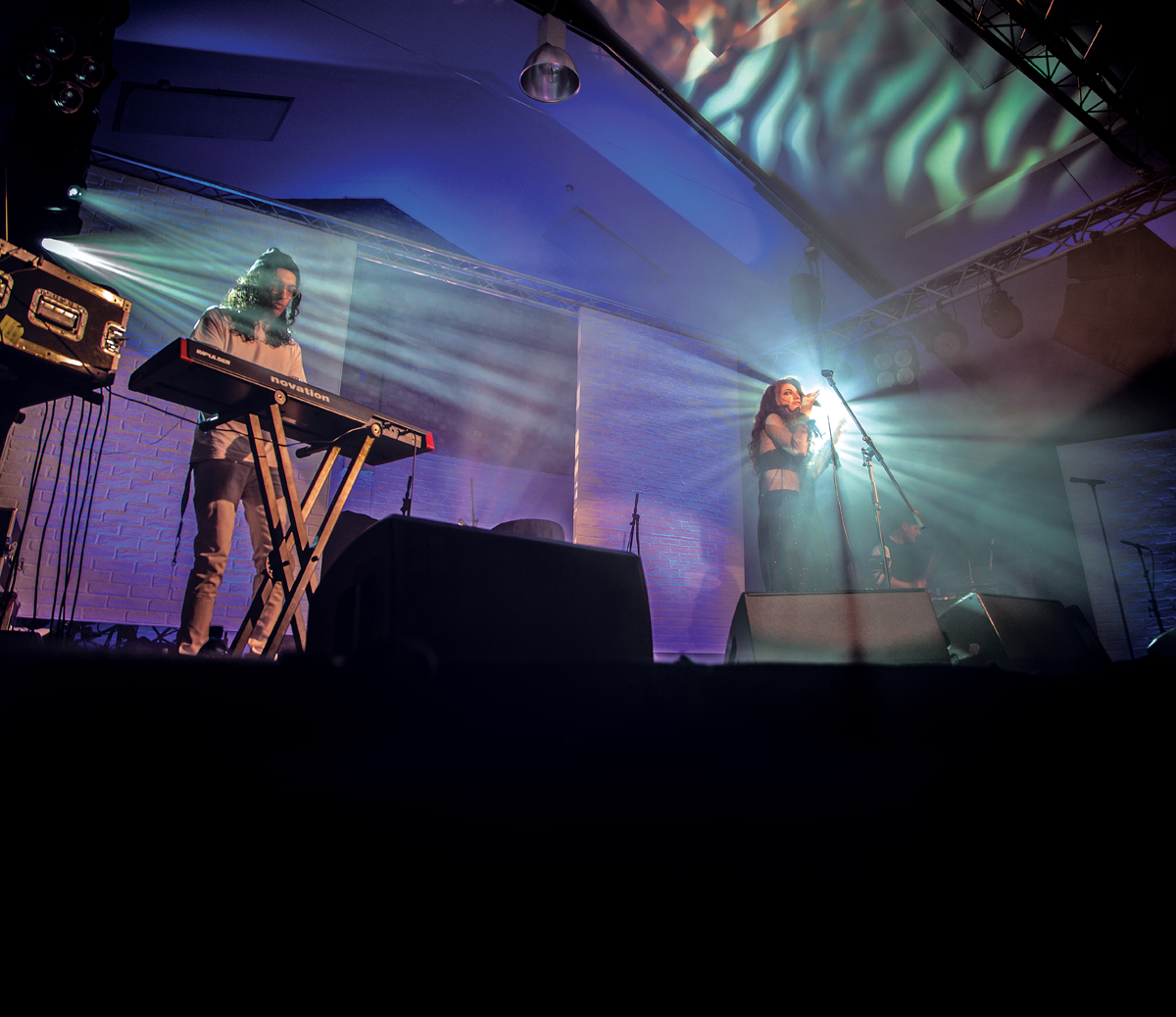
Surely one of the songs of last year was Lorde’s Royals. The haunting song – stylistically very individual but if you had to describe it, arguably lying somewhere between Bjork and Rihanna – was a surprise hit. Indeed a massive one; one of those songs once heard and never forgotten so perhaps not a surprise after all. It first hit number one in Lorde’s (aka Ella Maria Lani Yelich-O’Connor – no wonder she went for a snappier stage name) home country of New Zealand before hitting the top of the US Billboard charts.
Lorde’s fame, sales and fan base have sky-rocketed since and the plaudits have come thick and fast. Her debut album, Pure Heroine, hit the top 10 in many countries across the globe, shifting over half a million in the US alone. She was nominated for four Grammys – winning two of them last month – and has won fans among the elite of music, with David Bowie apparently telling her that her music is the future…
Jimmy Mac is one of the key people in Lorde’s current set-up taking the live tech duties. He’s also been with her for much of her albeit short career so can not only offer an insight into the technology behind a huge star but also the lifestyle. We’ll start, though, with his own background…
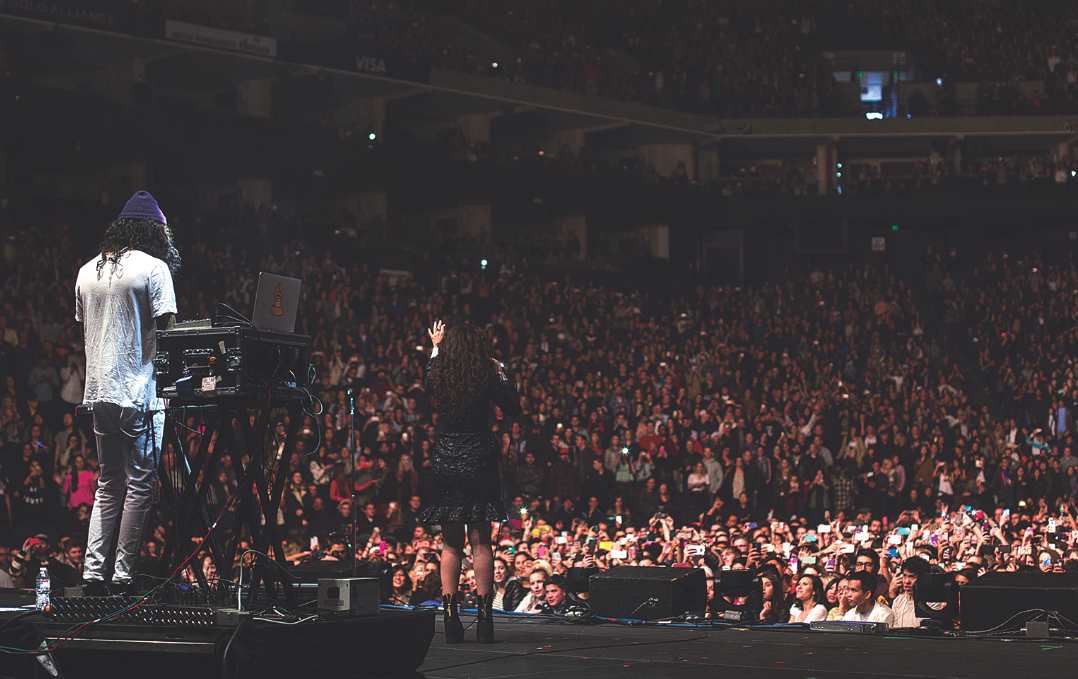
Lorde went from playing to hundreds to thousands in a very short time
MusicTech: How did you get into music?
Jimmy Mac: It was through my parents. My mum used to conduct orchestras in Singapore and my Dad used to play in a jazz band. When my Mum moved here to New Zealand from Singapore the only job she could get was teaching drums after school at the primary school I went to, so I used to just go along to that and joined in. I ended up playing in so many different kinds of bands growing up. My friends listened to a lot of Metal but my Dad used to take me to all the jazz shows that would come to town.
Jimmy Chamberlain the drummer from the Smashing Pumpkins was my hero. I used to listen to the Siamese Dream album religiously and knew every fill on the record – I used to sit in my room and pretend I was playing that to a big crowd. I went to Jazz school after high school but decided that I didn’t want to do three years of playing jazz – everyone there ended up doing the cruise ship circuit which wasn’t really what I wanted to do.
MT: So when did you get in to the technology side of music?
JM: It was only last year I was playing for an artist that and we started using Ableton Live. I did an on-line course for it purely out of fear that I wouldn’t know what to do if it crashed. I ended up loving Ableton because I could make music on the drum racks which was so percussive and was easy to jam on.
MT: Tell us a little about your studio – main components, how it came together, history etc…
JM: It’s very generous to call it a studio. But it really just consists of a MacBook Pro, I found an old Roland Juno 106 in my uncle’s garage, and a Moog Slim Phatty I bought off a second hand website. I use my Focusrite Scarlett 18i20 for my studio interface and Ableton as my main DAW. I’ve got a bunch of soft synths including Absynth, Sylenth, lots of the vintage classics from Arturia, Massive, Reason, and FM8. I use a Novation SL MkII to control it all, it’s so easy.
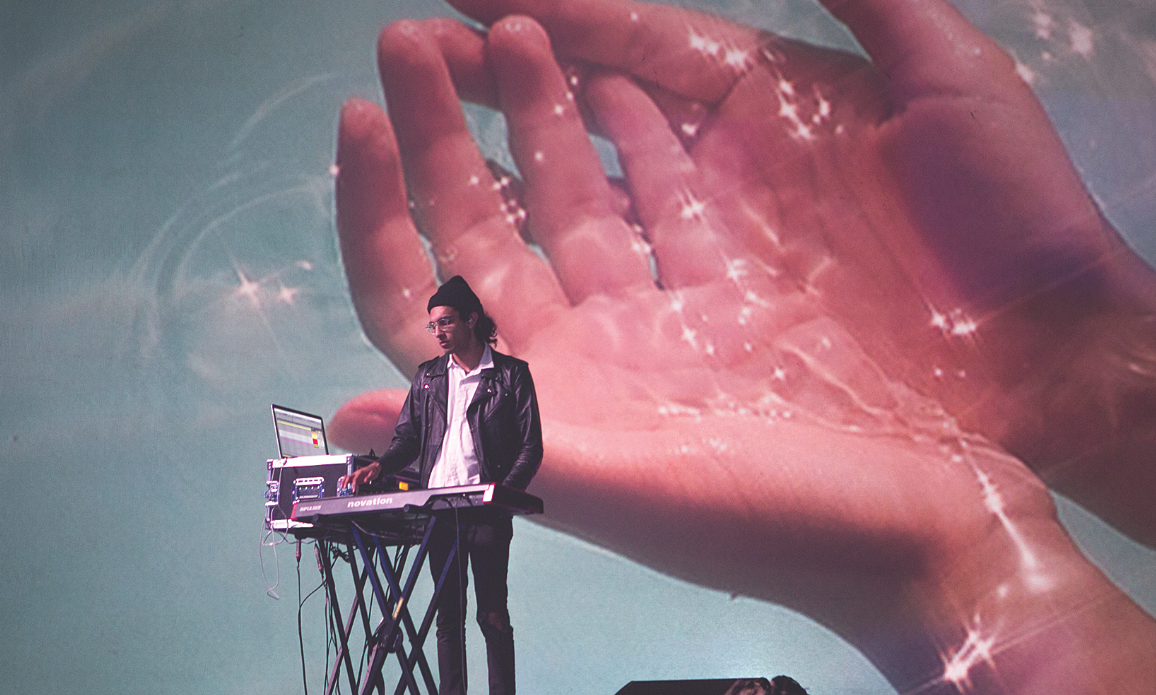
It’s a fairly simple – not to mention exposed – live set-up but an effective one nontheless
MT: How did you get involved with Lorde?
JM: I was at the New Zealand music awards two years ago playing for another artist. Ella was sat at our table and that was the first time I met her. She released her EP late last year and at the same time the artist I was playing for ended up being an X-Factor judge here in New Zealand so I knew I wouldn’t have any shows for a while. I was just playing drums in this punk band called the DHDFD’s who played, like, once every few weeks. I was a big fan of the EP she released and I knew her management so I emailed them about playing for it. And with a bit of arm twisting managed to convince them I was their guy.

MT: What is your role in the Lorde set-up?
JM: My role is to basically to take the songs from the record into a live scenario and to make any idea she wants to do live possible. It was great being able to work with her producer Joel so closely. He sampled everything out from the record so it sounds pretty close to it. I control all our in ear monitors on stage as well. We had some absolute cowboy of a monitors guy at a festival in Australia that put our click through the wedges so after that didn’t trust anyone so we take care of that ourselves.
MT: You must all be blown away by the rapid success – tell us a little on how you are all coping with it…
JM: Yea it’s mental. Our first show was playing to a room of 150 people in Auckland and then our sixth show was playing to 15,000 at a festival in Australia! The first time we came to America me and the drummer Ben thought that we’d be just a couple of Hillbillies from New Zealand and a couple of amazing session guys would be waiting at the airport to step in for us and we’d be on the next plane home. We acted like a couple of insecure girlfriends for the first few weeks, but it’s a good feeling knowing that you stack up in America coming from New Zealand. It’s so nice to play for something that you are so proud of. It’s cool, most of the crew are from New Zealand so everyone just feels like homies.
When she was number 1 in America it didn’t feel real. I ran out of ways to celebrate so I walked in circles for a bit then settled on a cigarette. Now she’s up for four Grammys. It’s amazing but everyone is pretty chill in our crew. It’s nice coming back to NZ after these trips getting to hang with my homies who don’t really give too much of a shit about it all. Playing for a Grammy nominated [now winning – Ed] artist makes me feel a satisfied man. I could happily retire and work in IT now. It’s a weird thing to be doing exactly what you’ve always dreamed of doing. By the end of next year I would’ve ticked off most of what I thought I would never achieve so I need to reevaluate and see what’s next.
MT: Any amusing incidents along the way?
JM: I don’t know. Ella bought Taylor Swift on to our bus one time then Ella said she had to go do interviews and left us with Taylor. I’ve got about 15 minutes worth of time I can be funny for. So I went through that routine and did some world class flirting.
It’s funny how big it has got but me and Ben the drummer still set up and pack down all our own gear. We tour with the shittiest plastic keyboard case that came with my Juno 106. The latches are broken off it.
We always need to tape it up at the airport. I’m surprised my keyboard still works. I’ve got this theory that the shitter your case is the more delicate the airport guys treat it. But when you get a good case they throw it around. I’m gonna make cardboard road cases and I guarantee my gear will be handled with respect and grace.

David Bowie apparently said to Lorde that she is like ‘listening to tomorrow’
MT: On your own music, how would a track typically start structure wise and then progress?
JM: I’d start with drums usually because I’m a drummer. But I don’t think there’s any one way that you should start a song. Inspiration can come from anything or any sound. I think the moment you start trying to put a formula on music then you will make shit music.
MT: What are your favourite sound generating studio tools – synths, guitars etc – and why?
JM: Well the homies at Novation just sent me a new Bass Station II which rules. I been loving playing on that. It’s one of the first things I’ve come across that combines the ease and simplicity of soft synths with the sound of analogue. It always a nice base to start with.
MT: And outboard – what plug-ins or outboard do you find most creative and most useful on a day to day basis and why?
JM: A new thing I’ve been messing around with is running vocal samples through the Ableton arpeggiator and fucking with the automations can end up stumbling across some cool sounds.
MT: Tell us about the Lorde live set-up.
JM: We take two Novation Impulse 61s on the road and use one for backup. I split MIDI Channels in half on the keyboard and another one for the pads. There’s a lot of vocal samples triggered by the pads and little ditty sounds. We run MIDI from the SPD’s Kick Trigger back through the Impulse into Ableton so the side chaining is live. I’m going to be taking a SL MkII on the road next year to control a couple of analogue modules which I’m going to slowly work into the set when I get some time.
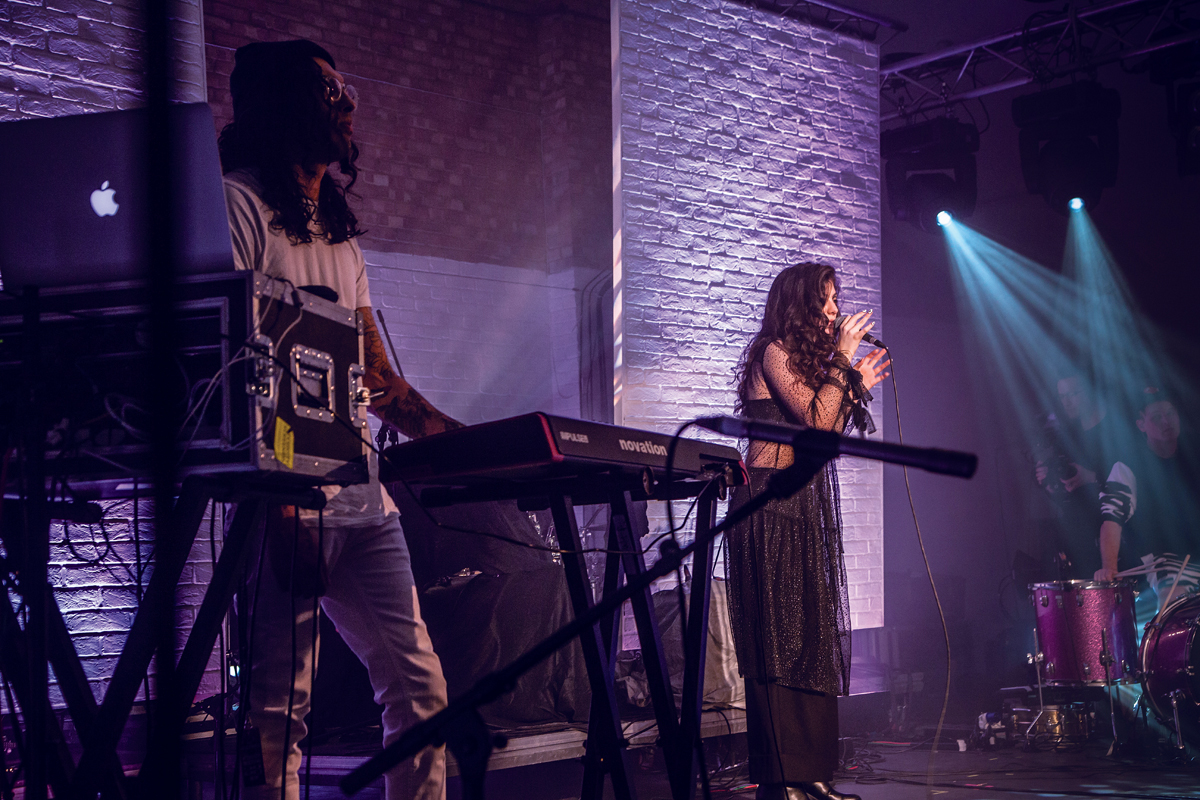
Jimmy takes two Novation impulse 61s on the road with Lorde
MT: What advice have you picked up from working in the industry that you can pass on?
JM: Well I’ve learnt to back up everything and not act like a twat. What I’ve learnt from playing for Ella is only do something that you’re proud of. Never do it for anything else like money. And don’t compromise your ideas and let them get watered down. Do something original and don’t try and sound like your favourite band because you will only end up sounding like a shittier version of it. I mean having influences is one thing but always put your own spin on it. Be wary of anyone trying to make a quick buck off you. I’ve learnt to not ever stop trying to learn stuff either because there’s always someone better than you.
MT: And from working in the studio?
JM: I haven’t done too much stuff in studio except for playing drums. But from what I gather the best shit comes out when you go in with the intention of just making something that you’d listen to. Every artist that I know that goes into the studio trying to write a #1 sounds like shit. And don’t be scared to try new stuff out or be a bit whack.
MT: Talk us through at least one of your production tricks or processes that you tend to use most often and that perhaps defines your sound over others…
JM: I Well this doesn’t really define me and it’s not exactly a trick. But I really hate it when stuff is quantized too much. It kind of takes away the essence of music. I kind of like stuff a bit sloppy or raw to an extent and I think a lot of electronic music can sound a bit emotionless. One technique I like to do when making music is to play the MIDI notes into your DAW and then send the sequence back into your hardware synths and then mess around with the tone that way.
MT: What is on your wish list studio gear wise?
JM: I guess I’d like a lot more analogue synths. Nothing sounds as tough and raw as those. I had a play on the Prophet 12 and that thing is dope. They’re pretty hard to come across in New Zealand, but now we are in the States a lot I can pick a few up a bit easier. I really want a vintage Ludwig kit just to have as well.
MT: What would you like to see developed in terms of studio technology and why?
JM: That’s a tough question. I’m really not sure. The stuff in Ableton with being able to convert audio into MIDI was pretty mind blowing. I use that thing a lot when I’m just mucking around. I think everything is already there. If you can’t make good music with the technology available now you must be a moron. How about some kind of in built interface and DI rack and computer all in a one piece package? That would make my life extremely pleasant.
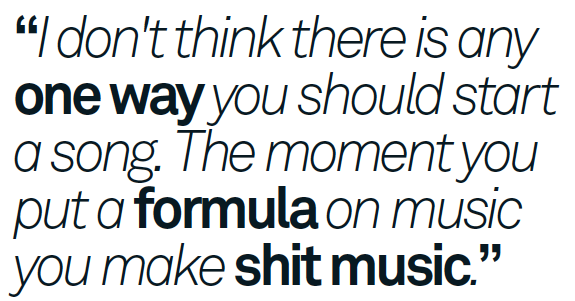
MT: What is your overall philosophy or approach when it comes to music?
JM: What the artist wants comes first. Don’t let your ego come in the way of that. Don’t overplay. I saw an amazing drummer a couple of weeks ago and he played just about every rudiment in the book and was so tight but by the end I was like ‘just play the fuckin beat man!’ Always be asking yourself what can you do to make this sound better and take lots of rescue remedy.
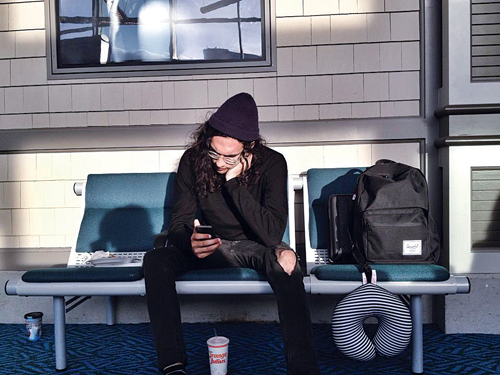
It’s a great life backing a superstar but you still have to wait around a lot
MT: What have you got planned for the near future both with Lorde and yourself?
JM: Well it’s summer in New Zealand. I just bought an inflatable boat called the Explorer 300. I intend to spend a lot of time on that. I told Diplo to come for a spin when he’s here early next year. We’re bumping up the production of the show next year so I guess there’ll be a bit of rehearsals early next year and then we are touring the whole year. We start with the Grammy’s then there’s Laneway tour which goes to Singapore, Australia and New Zealand. There’s a lot of rad bands on that tour I’m super excited about seeing Danny Brown. Then we are doing 20 states in America then three Lollapalooza shows in South America. The whole year’s kinda looking like that. I also need to make a road case for the Explorer 300…